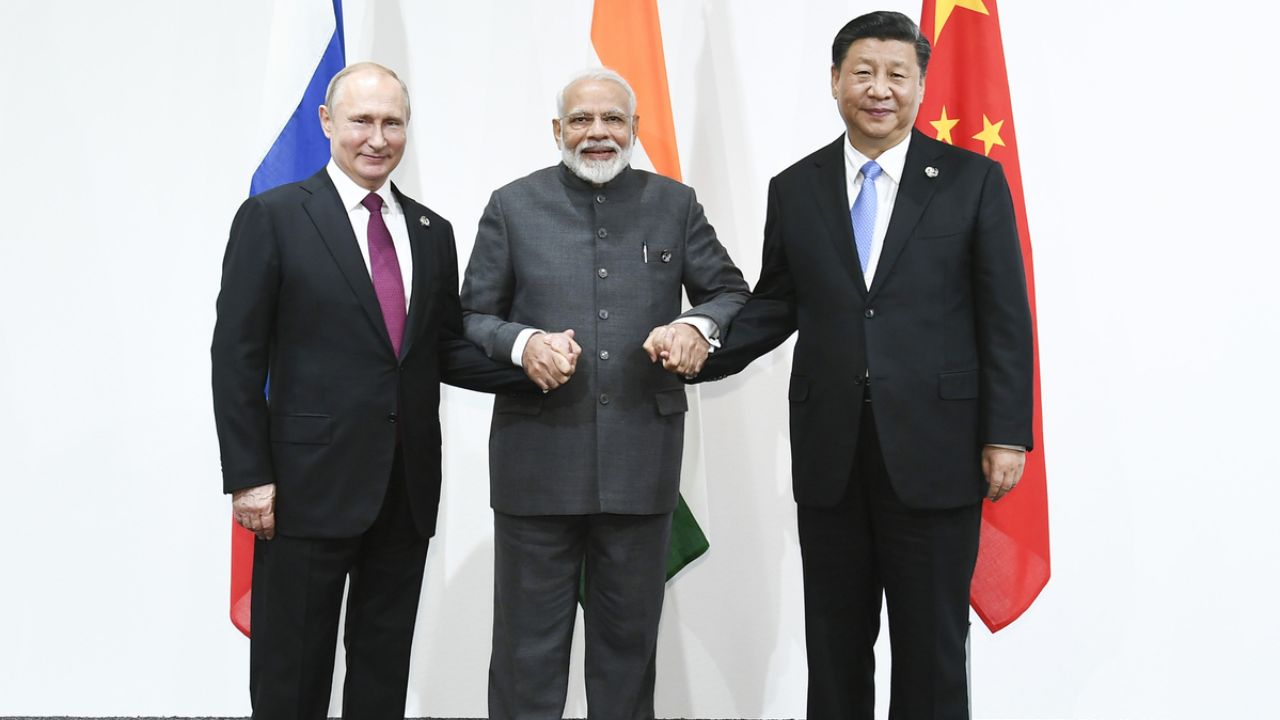 English
English

Experts remember how Defence Minister Rajnath Singh had left the SCO summit before its commencement without signing the joint statement, as it did not condemn or mention the sordid Pahalgam terror attacks. However, Foreign Minister S. Jaishankar had attempted to ameliorate the inimical relations, albeit unpalatably. Experts had anticipated that PM Modi would be less likely to visit China for the SCO Summit. But Donald Trump’s aggressive policies have pushed Russia, China, and India into a new alliance.

PM Modi at the center with Putin and Xi Jinping (Image Source: Internet)
New Delhi: US President Donald Trump is taking tough economic steps against India, such as increasing the duty on Indian products from 25% to 50%, but at the same time the US government has reticently frown upon his decision as it thinks that if US puts excessive pressure on India, India can strengthen its relations with China.
In this context, Prime Minister Narendra Modi's upcoming visit to China (31 August - 1 September) becomes important, as this will be his first visit to China after seven years.
Revival of Russia India China (RIC Block)
Experts remember how Defence Minister Rajnath Singh had left the SCO summit before its commencement without signing the joint statement, as it did not condemn or mention the sordid Pahalgam terror attacks.
However, Foreign Minister S. Jaishankar had attempted to ameliorate the inimical relations, albeit unpalatably. Experts had anticipated that PM Modi would be less likely to visit China for the SCO Summit. But Donald Trump’s aggressive policies have pushed Russia, China, and India into a new alliance.
India: Strategic Partner of US?
US State Department's Principal Deputy Spokesperson Tommy Piggot has given a balanced response to this entire matter. He described India as a 'strategic partner' of the US and said that clear and honest dialogue is going on between the two countries.
Piggot also admitted that it is difficult to agree on every issue in foreign policy, but it is important that both sides share their concerns openly. He emphasized that the US will continue to express concern with India on issues such as trade imbalance and oil purchase from Russia, but this is part of the dialogue.
When Pigott was directly asked whether the US fears India's proclivity towards China, he denied it and said that this is a normal part of diplomacy. He said that there may be differences between the US and India, but the relations between the two countries are so strong that they can deal with these challenges.
US needs India to counter China
It is clear from this entire incident that the US considers India as its important ally, but at the same time it does not want India to distance itself from China under its pressure. That is why the US administration has exercised restraint in its response towards India.
On the other hand, India also wants to maintain a balanced relationship with both China and the US under its independent foreign policy.
Uncanny Geopolitics
In short, this is a delicate diplomatic game in which all three countries—the US, India and China—are trying to fulfill their respective interests. The US is putting economic pressure on India, but at the same time it also wants to ensure that India does not move away from its camp.
On behalf of India, Prime Minister Modi's visit to China is an indication that India does not want to depend on any one party, but wants to maintain its strategic autonomy. It remains to be seen in the coming times in which direction this triangular relationship moves forward.